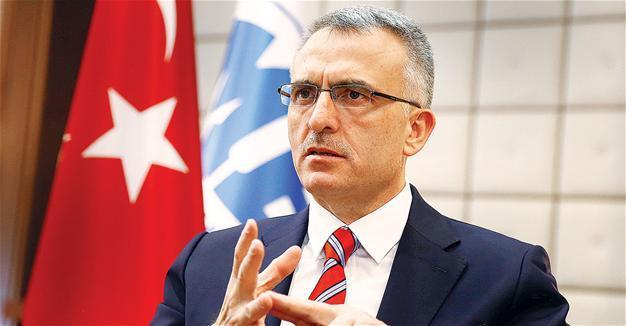Turkey may make further tax cuts to boost flagging growth, finance minister says
ANKARA-Reuters
 Turkey may make further temporary tax reductions to try to boost flagging growth after a disappointing third quarter, in addition to its efforts to expand credit and bolster domestic demand, Finance Minister Naci Ağbal told Reuters.
Turkey may make further temporary tax reductions to try to boost flagging growth after a disappointing third quarter, in addition to its efforts to expand credit and bolster domestic demand, Finance Minister Naci Ağbal told Reuters.Turkey’s economy has been hit by a failed military coup in July and uncertainty about the emergency rule imposed in its wake, which has made both investors and consumers cut back on spending. Ankara’s deepening involvement in the conflicts in neighboring Syria and Iraq have added to the concerns.
Industrial production shrank 3.1 percent year-on-year in September, prompting economists to cut their growth forecasts and making the government’s target of 3.2 percent growth in 2016 look extremely difficult to achieve.
“We are aware of the problem. The economy is slowing ... the third quarter numbers did not come in well,” Ağbal said in an interview in his office late on Nov. 10, declining to say whether the official growth target would be changed.
“The government is trying to use all possible instruments, including monetary policy, including macro-prudential measures and fiscal policy measures, and we will continue to take any additional measures in order to give the economy some impetus.”
Prime Minister Binali Yıldırım met the heads of Turkey’s biggest banks this month to urge them to lower their interest rates. The central bank has meanwhile cut policy rates at seven of its last eight meetings despite weakness in the lira currency, which has hit a series of record lows in recent weeks.
“At the ministry of finance, we are working on some tax measures, temporary tax reductions if possible, but at the same time we have to take into account fiscal discipline,” Ağbal said, without giving further details.
The government is targeting growth of 4.4 percent next year, but that also looks optimistic, economists say, particularly if Turkey holds a referendum on changing the constitution to create a more powerful presidency in the spring, as expected.
Ağbal also said Turkey had collected an additional 1.7 billion Turkish Liras ($520 million) so far under a tax amnesty which was announced on Aug. 4 and runs until Nov. 25.
A total of 54 billion liras in taxes have been restructured so far under the program, he said, meaning the government’s final additional take is likely to rise significantly. Under the amnesty, debts can be cleared in cash within 36 months.
He also said he was optimistic that a measure allowing people to bring assets held abroad to Turkey to invest in companies, property or banks without being taxed, would see a “huge amount of money” pour in, though he declined to say how much. The scheme runs until the end of 2016.
Industrial production shrank 3.1 percent year-on-year in September, prompting economists to cut their growth forecasts and making the government’s target of 3.2 percent growth in 2016 look extremely difficult to achieve.
“We are aware of the problem. The economy is slowing ... the third quarter numbers did not come in well,” Ağbal said in an interview in his office late on Nov. 10, declining to say whether the official growth target would be changed.
“The government is trying to use all possible instruments, including monetary policy, including macro-prudential measures and fiscal policy measures, and we will continue to take any additional measures in order to give the economy some impetus.”
Prime Minister Binali Yıldırım met the heads of Turkey’s biggest banks this month to urge them to lower their interest rates. The central bank has meanwhile cut policy rates at seven of its last eight meetings despite weakness in the lira currency, which has hit a series of record lows in recent weeks.
“At the ministry of finance, we are working on some tax measures, temporary tax reductions if possible, but at the same time we have to take into account fiscal discipline,” Ağbal said, without giving further details.
The government is targeting growth of 4.4 percent next year, but that also looks optimistic, economists say, particularly if Turkey holds a referendum on changing the constitution to create a more powerful presidency in the spring, as expected.
Ağbal also said Turkey had collected an additional 1.7 billion Turkish Liras ($520 million) so far under a tax amnesty which was announced on Aug. 4 and runs until Nov. 25.
A total of 54 billion liras in taxes have been restructured so far under the program, he said, meaning the government’s final additional take is likely to rise significantly. Under the amnesty, debts can be cleared in cash within 36 months.
He also said he was optimistic that a measure allowing people to bring assets held abroad to Turkey to invest in companies, property or banks without being taxed, would see a “huge amount of money” pour in, though he declined to say how much. The scheme runs until the end of 2016.
















